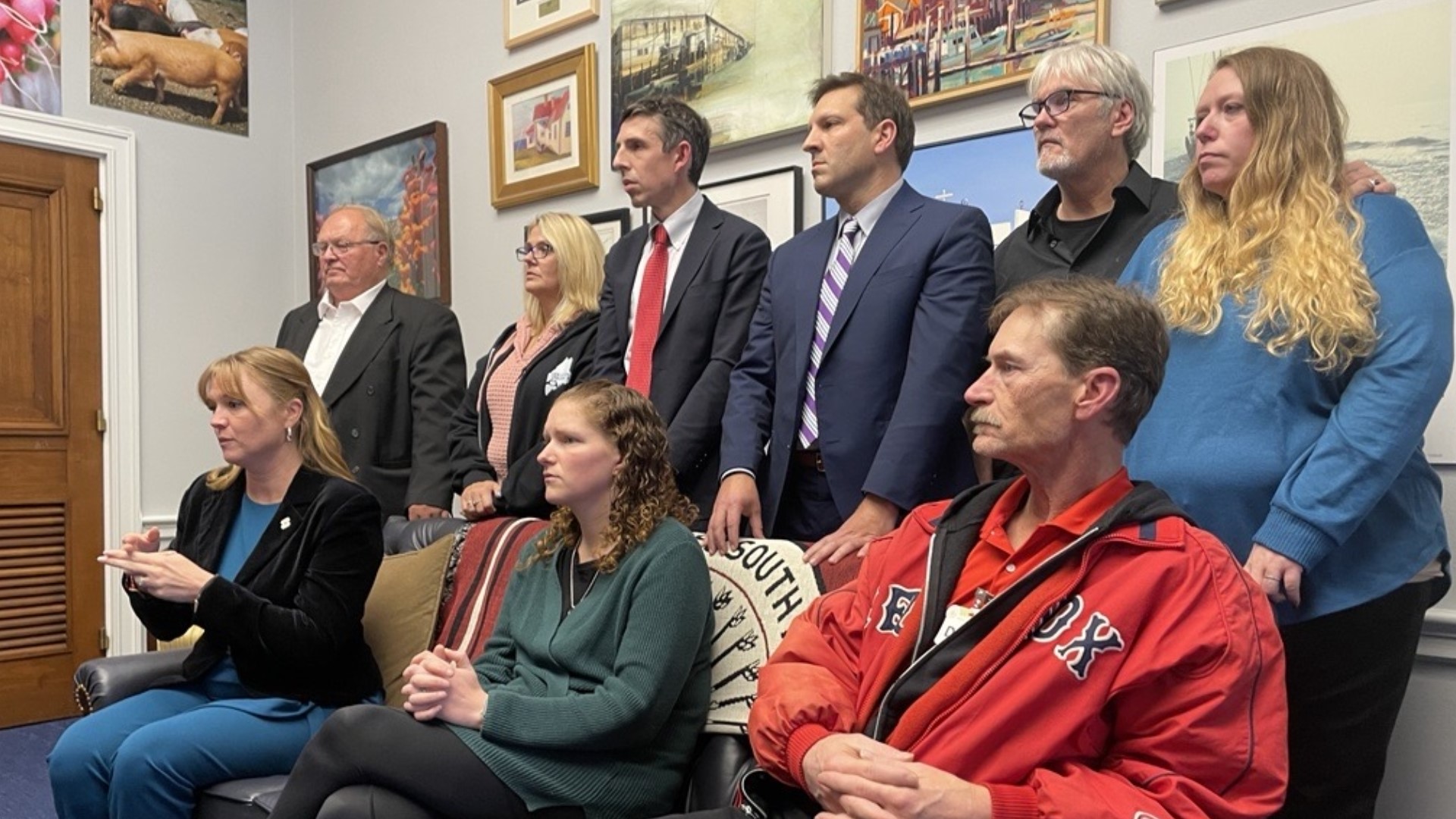WASHINGTON D.C., DC — They were gone as quickly as they arrived. It was an early morning flight on Thursday with a half-dozen people, determined to hear about solutions in the wake of losing their loved one in Maine's deadliest mass shooting, and even surviving it themselves.
Alan Nickerson, a man who was shot in Lewiston and lived, along with five family members of the deceased Joshua Seal, Joe Walker, and Arthur Strout.
But while their trip to D.C. was jam-packed with meetings and lasted for only a day, they turned heads as the group, accompanied by attorneys, went from the House offices to Senate offices.
"I hope we can make some changes because no one wants this to happen to you," Elizabeth Seal, the widow of Joshua Seal, said.
Elizabeth said she and Joshua knew each other since pre-school and reconnected later in life as their relationship grew.
Joshua was a profound member of the deaf community, bringing an experience camp for deaf kids to Maine for the first time. He was shot and killed on Oct. 25 along with 17 others.
"Really the whole shooting situation just feels like a nightmare, I'm still expecting him to walk through the front door," Elizabeth Seal said.
And while the focus of the meetings with each of Maine's four lawmakers was about pushing for an investigation into the Army Reserve, where Lewiston gunman Robert Card was based out of, the fire burning in many families is one of change.
For Arthur Bernard, whose son Arthur Strout was killed, the change he wants to see comes in the form of getting high-powered assault weapons off the streets.
"He was loved by a lot of people ... so no ... I'll probably never let this go," Bernard said. "Until I figure out who is going to be the person to make that change because someone has to."
When it comes to Maine's congressional delegation, there is a difference in how they view gun reform.
For Rep. Chellie Pingree, she has long stated Maine needs a stronger rule than the state's Yellow Flag law, which requires a series of steps in one's mental health history to effectively take their weapons away.
"As far as I'm concerned there is a list of things we need to change ... guns like that shouldn't be available," Rep. Pingree said.
Pingree added that if an investigation into the Army Reserve found the Yellow Flag law should have been used to take Card's guns away, and if it just needs to be implemented more, she said it's something she is willing to work on.
Another gun reform proposal comes with Sen. Angus King's co-sponsored bill called the GOSAFE Act.
The bill, if voted through, would limit the capacity for magazines used in high-powered weapons. It would also create a voluntary buy-back program for such high-powered weapons.
When asked if he thinks the bill has any legs, King said it's about getting enough Republicans on board.
"To be honest, the question is bipartisan support and that is difficult," Sen. King said. "We're talking to Republicans and they are taking it seriously ... but it is no surprise it's a highly controversial issue."
Speaking of Republicans, Sen. Susan Collins said she is still reviewing King's GOSAFE Act and said she has yet to take a position on it. She added that while she is reviewing this, she has supported expanding background checks.
Collins, who is an outspoken supporter of Maine's Yellow Flag law, said it should have been used in the case of Robert Card, and said she is working on legislation that would require branches of the military to invoke whatever law a base's state uses to confiscate someone's guns.
Collins also would not take a position on the potential future of an assault weapons ban, as her colleague in the House, Rep. Jared Golden, said in the days following the shooting he supports. The Senator said she supported an assault weapons ban in the past but did not want to continue with it since an updated bill to that previous ban would have impacted too many kinds of firearms. That bill came up in 2013.
Meantime, Rep. Golden's new stance on an assault weapons ban made the national spotlight, as he was previously opposed to many proposed bans in the past.
The congressman was not available for an interview, but met with the Lewiston families for around an hour, as did the rest of the delegation.
The families ended their day in Washington with a visit to the White House Office of Gun Violence and Prevention.
White House officials told NEWS CENTER Maine it was closed to the press, but Arthur Bernard, who spoke at the 11th Annual Vigil for Gun Violence in D.C. Wednesday, said he wants to see some change come from this tragedy.
"I've seen a million things change in 60 years," Bernard said in an interview before leaving for D.C. "I'm 62, I've seen a million things change but this is one thing that just has to change."
While it's unknown what the future of gun legislation looks like for Maine's lawmakers, the search for justice for the families impacted by the Lewiston mass shooting is certain.
"I don't think I'll ever stop trying to do something about these gun laws," Bernard said. "What does it really take for them to change their mind about these gun laws."

